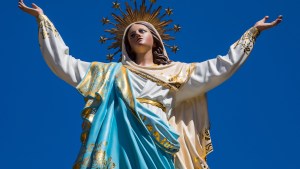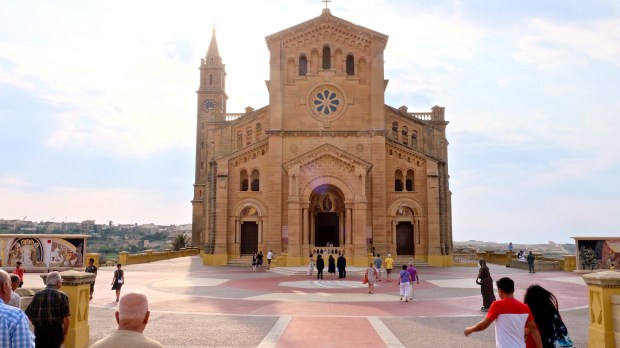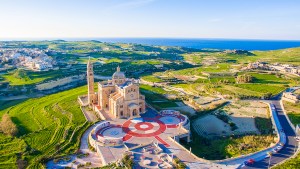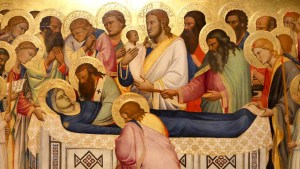Pope Francis will visit Malta on April 2 and 3. He will travel by catamaran to the small island of Gozo where he will pray at the Marian shrine of Ta’Pinu. The bishop of this diocese, Bishop Anton Teuma, talks about this historic visit to the island.
Could you please describe your diocese of Gozo?
Bishop Teuma: It’s a very small diocese, probably one of the smallest in the Catholic Church. But it’s very active. Gozo has 40,000 inhabitants. There are many migrants, from Europe and other regions. We can live together because the people are generous and allow everyone to live with them in peace. We have 15 parishes and we’re blessed with 120 priests. It should be noted that one third of them are over 65-70 years of age.
Sunday Mass attendance is still good. Our parishes are active, especially during the summer feast days celebrated in all the parishes of Gozo. We have many Catholic movements and good pastoral activity with young people and couples.
There’s also a Marian shrine, Ta’Pinu, where the Pope will come to pray on Saturday. This place dates back to the 15th century. At that time there was just a small chapel built in the countryside, with a painting representing the Assumption of the Virgin. In the 19th century, a peasant woman heard a voice inviting her to pray three Hail Marys in reference to the three days Mary spent in her tomb before being taken to Heaven.
After the miracles, the shrine became a major pilgrimage center. Many people come to ask for the intercession of the Virgin for healings. The Pope was keen to come here because he’s particularly fond of Marian shrines.
We hear that the island is affected by a growing secularization, that young people are going to church less and less.
Bishop Teuma: Young people do not come to church as they used to. In the past, the practice was undoubtedly more cultural and traditional. Maybe it wasn’t based on conscious will, on listening to the word of God.
There are many people today who have faith and who live it in a deeper way. And they have the desire to pass it on to others. So in our view, there’s hope. There are probably fewer people practicing in quantity but we have more quality.
Like everyone else, we’re confronted with consumerism, materialism, and egocentrism. It is not easy today to transmit the word of God, which is based on charity and generosity. The predominant logic is that of self-centeredness. This is a challenge that we face.
A few hours before the arrival of Pope Francis in your diocese, how do you feel?
Bishop Teuma: I haven’t had time to stop and see how I’m doing! Like everyone else, I feel excited to welcome him. We want to celebrate this moment of prayer. I’d not only like to see the fervor and the participation of the flock, but I’d like—and I ask God, through the intercession of Our Lady—for this event to renew us as Christians. It must transform us. Otherwise, it will be a celebration with the Pope coming and going, without anything changing. I’m sure that this isn’t Pope Francis’ intention. He would like to leave this scent of the presence of the shepherd, of the Gospel and of the Eucharist.
What do you think are the main goals of this trip?
Bishop Teuma: To invite us once again to open our hearts and homes to welcome the poor, especially migrants. At present, we see that many refugees are fleeing countries at war, especially in Ukraine. This invites us to be generous, as our ancestors were with the Apostle Paul when he came in 60 AD.
That’s an important part of this trip. But the Pope should also talk about materialism and secularism. They represent enormous obstacles for modern people including Christians. The Pope will invite us to pay more attention to these obstacles, which don’t help anyone who wants to be a true disciple of Jesus to go forward.
The geographical situation of Malta means that the island is subject to very significant immigration from Africa. How does the population experience this on a daily basis?
Bishop Teuma: The Maltese are generally very generous and kind. But selfishness doesn’t always allow us to fully open our homes and hearts to those who come from abroad. We put limits on our generosity, even in the way we treat migrants who become workers on our island.
We need to treat them more humanely. We sometimes tend to use them as a labor force, but without treating them as we treat other Europeans.
Your predecessor in Gozo, Cardinal Mario Grech, is now General Secretary of the Synod of Bishops. From Rome, he’s leading the Synod on Synodality, which was launched throughout the Church last October. What impact is this synod having for you?
Bishop Teuma: From the very beginning of the Synod, we succeeded in calling all our groups and communities. We’ve worked with them in examining our situation in Gozo. We’ve dedicated the whole pastoral year to this self-examination and we’re now waiting for the group reports. From this we will draw up a program for the coming pastoral year, and a pastoral plan which won’t be imposed from above but will come from within. This is how we live today the call of the universal Church.




